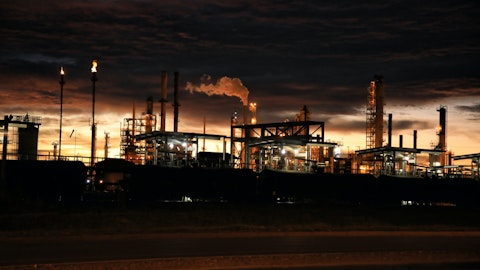George Maxwell: Okay. I will start this conversation, but Thor may finish it when it comes to the wells. I mean, we have really only completed one significant horizontal well in Egypt, which was the Arta-77. As you are aware, in the previous calls we didn’t get the results in that well that we anticipated. The well continues to produce. I mean it — I think, I am remembering numbers now, I think, we started around 200 barrels a day, the last call it was down to about 120 and right now it’s around 80 barrels a day. So it continues to produce. It is one of our workover candidates. But I will let Thor jump in if we are planning to do more horizontal wells there, I think.
Thor Pruckl: Yeah. So, the well — as George mentioned, the well is still on production and it seems to be flattening out the curve. We did have some issues with the drilling of the well, as well as the completion of the well with the pump placement and a tangent section in a well. So, we originally had two wells planned, we delayed that second well and now we are looking at potentially doing some more or additional, I guess, technical work on drilling, potentially another well, a horizontal well late in 2024 with the learnings that we have got out of that well.
George Maxwell: Sorry, Bill. The second part of your question on acquisition updates. Well, obviously, we have said and in relation to the strategy, I know we got a shareholder question, what does VAALCO’s future look like? In the last three years, we have each year doubled the size of the company, doubled production and we are starting to reap the benefits of having that derisking of a single asset company, and that I think, was clearly demonstrated to our benefit in Q3, having multiple areas of production when certain areas are going through some areas of difficulty. So when we look at the field of M&A opportunities, that field is extremely narrow. It was very wide 12 months ago with the IOCs mainly deciding that they are no longer divesting and with — at the top of the price curve, the divested opportunities are the opportunities that we see in Africa at prices where we would not want to compete.
There are still fields where accretive opportunities are available and we do continually review these. It’s not always in our primary jurisdiction. So we are actually having to deviate and look at opportunities for value rather than just geography, but the market is exceedingly tight. We are no different from some of our peers other than we are debt free and that, all of our peer companies are performing well under the higher commodity prices and they are all seeking the same opportunities. So we tend to try and drive towards bilateral positions where possible, because process positions can tend to become uncompetitive very quickly. But the market is still there, we are still reviewing opportunities. It’s not completely dead to us.
Bill Dezellem: Great. Thank you, both.
Thor Pruckl: Thanks, Bill.
Operator: The next question comes from Jamie Wilen with Wilen Management. Please go ahead.
Jamie Wilen: Hi, fellas. Given the large amount of cash you were able to put on the balance sheet between the second and third quarters, as you look forward with limited capital expenditures, are you looking to similarly bulk up the balance sheet by $50 million each quarter over the next few?
George Maxwell: That’s a reasonable good question. I think it’s — we can’t hide the fact. We have got limited CapEx in Q4. We are forecasting at least two to three liftings out of Gabon. So, yes, our projected position for Q4 would be another strong cash performance. We have yet to land on the allocation of capital for 2024. But as I said, we do expect to commence the drilling in Canada very early January, February and they are coming in roughly at $4 million to $6 million per well, yeah, is that?
Ron Bain: Yeah.
George Maxwell: And so, we will still be — in terms of where we have been before, Jamie, with the drilling in Gabon, we are going to have a pretty light CapEx in Q1 and Q2.
Jamie Wilen: Got you. Given the progress you have made in Canada, what are your thoughts on monetizing that asset and devoting a good bit of that to — for the next drilling campaigns, as well as a share buyback and what do you think Canada would really be worth?
George Maxwell: Well, we have a valuation of Canada because we carry on the books. So the valuation on the books, I think, rest between $80 million and $100 million. Ronald, tell me if I have got that number wrong.
Ron Bain: You are probably near the upper range.
George Maxwell: All right. What I will say, I will repeat what I said last quarter. I mean, the turnaround in the Canadian operation has been exceedingly impressive. The team up there have done a tremendous job. They have delivered to us a five-year plan that is cash positive and returns cash every single year. The focus on the change of drilling techniques to the longer reach laterals, the focus on adding the land in order to achieve that has been extremely successful. Thor’s just reminding me, the — how we drill and complete the cycle times have also been reduced considerably, I think, 68 days, something ridiculous.
Thor Pruckl: Roughly half.
George Maxwell: Half. So we now have a valuable, very efficient operation, but to be frank, to be big in Canada, we need scale. So there’s always a consideration of whether that scale exists and whether the best use of capital is to continue to grow and invest or look at other opportunities. So we do consider that all the time and when we look at the 2024 position, that will be part of that consideration.
Operator: The next question comes from Jeff Robertson with Water Tower Research. Please go ahead.
Jeff Robertson: Thanks, George. Just to follow up, has there been any change in anybody you deal with the Hydrocarbon Ministry in Gabon in light of the [inaudible] back in August?
George Maxwell: Good question. Obviously, yes, there have been some change, because I think, the previous Minister was removed. But as I stated, I guess, the day after that event, we have seen — we were out of the office for one day. We have seen no interruptions to our operations whatsoever. We continued to work diligently with the government, both on our investment profile and on our backdated positions where we are looking to make some recoveries on receivables. Ron mentioned about the tax event that exists and causes us movements in our tax position because of the mark-to-market. We are also working with the government to see how we can improve the position between their unlifted barrels and our outstanding receivables.
And that’s something, I am down in Gabon later this month and that’s one of the topics of discussion. But, again, from a relationship standpoint, some of the players have changed, but at the same time, our business has been completely uninterrupted.
Thor Pruckl: Yeah. If I could just add to that. If anything, I would suggest that it’s become a more positive climate and a more active climate with more engagement with ministries.
Jeff Robertson: Thank you.
Operator: The next question comes from Bill Dezellem with Tieton Capital. Please go ahead.
Bill Dezellem: Thor, I’d like to follow up on your last comment and does that improvement or positive relationship include a desire, a recognition, an interest, I don’t know what the right term would be to stay more current on their payables to you?
Thor Pruckl: Yeah. I mean, I think, there’s a — the government is — has changed and I think there’s a significant drive to, I guess, streamline and to get their books in order and that means that, they are looking to clean up their payables, they are looking to clean up their accounts receivable and get processes in place so that that doesn’t happen in the future.




